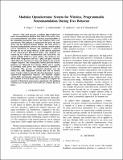Modular Optoelectronic System for Wireless, Programmable Neuromodulation During Free Behavior
Author(s)
Orguc, Sirma; Sands, Joanna; Sahasrabudhe, Atharva; Anikeeva, Polina Olegovna; Chandrakasan, Anantha P
Downloadembc_2020 final.pdf (5.077Mb)
Open Access Policy
Open Access Policy
Creative Commons Attribution-Noncommercial-Share Alike
Terms of use
Metadata
Show full item recordAbstract
This work presents a modular, light-weight head-borne neuromodulation platform that achieves low-power wireless neuromodulation and allows real-time programmability of the stimulation parameters such as the frequency, duty cycle, and intensity. This platform is comprised of two parts: the main device and the optional intensity module. The main device is functional independently, however, the intensity control module can be introduced on demand. The stimulation is achieved through the use of energy-efficient μLEDs directly integrated in the custom-drawn fiber-based probes. Our platform can control up to 4 devices simultaneously and each device can control multiple LEDs in a given subject. Our hardware uses off-the-shelf components and has a plug and play structure, which allows for fast turn-over time and eliminates the need for complex surgeries. The rechargeable, battery-powered wireless platform uses Bluetooth Low Energy (BLE) and is capable of providing stable power and communication regardless of orientation. This presents a potential advantage over the battery-free, fully implantable systems that rely on wireless power transfer, which is typically direction-dependent, requires sophisticated implantation surgeries, and demands complex custom-built experimental apparatuses. Although the battery life is limited to several hours, this is sufficient to complete the majority of behavioral neuroscience experiments. Our platform consumes an average power of 0.5 mW, has a battery life of 12 hours.
Date issued
2020-08Department
Massachusetts Institute of Technology. Department of Electrical Engineering and Computer ScienceJournal
42nd Annual International Conference of the IEEE Engineering in Medicine & Biology Society (EMBC)
Publisher
Institute of Electrical and Electronics Engineers (IEEE)
Citation
Orguc, S. et al. "Modular Optoelectronic System for Wireless, Programmable Neuromodulation During Free Behavior." 42nd Annual International Conference of the IEEE Engineering in Medicine & Biology Society (EMBC), July 2020, Montreal, Canada, Institute of Electrical and Electronics Engineers, August 2020. © 2020 IEEE
Version: Author's final manuscript
ISBN
9781728119908
ISSN
2694-0604